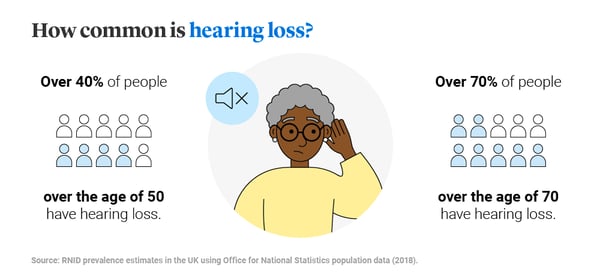What causes hearing loss as we age?
As we get older, many of us experience age related hearing loss. This of course can be challenging, as many of life’s pleasures – from listening to music to conversing with our loved ones – rely on our ability to hear. In this guide, we’ll explore what happens to our hearing as we get older, and some of the ways of identifying hearing loss symptoms so you can get the support you need.

You may also be interested in...
A hearing impairment, or hearing loss, refers to the reduced ability to hear sounds. Hearing impairments are common among older people; in fact, more than 40% of Britons over the age of 50 have hearing loss, according to Royal National Institute for Deaf People (RNID) estimates based on ONS figures.

During the ageing process, damage to the sensory cells in our inner ear ultimately causes hearing loss. However, there may be lifestyle factors that can cause hearing loss at any age; for example, you may have a job or hobby that exposes you to loud noise over a sustained period. Additionally, hearing loss can be associated with underlying medical factors, such as a family history of hearing loss, ear infections, or conditions like tinnitus, where people experience a persistent ringing or buzzing sound.
Hearing impairments can be caused by many factors, among them old age. If you’re experiencing gradual hearing loss in both ears, this might be attributable to the ageing process. But what are the other signs of hearing loss? Watch out for these clues:
- You struggle to hear what other people around you are saying
- Other people sometimes think you’re not listening when they speak
- You find yourself asking others to repeat themselves or speak more loudly
- You’re using a louder TV or radio volume than before
- You find it difficult to make out words while in a noisy or crowded place.
In addition, there are other hearing loss symptoms which are treatable and not necessarily connected with age. For example, if you have difficulty hearing in one ear, this may indicate an ear infection or earwax build-up. Alternatively, sudden hearing loss could be a sign of a perforated eardrum.
How to prevent hearing loss in old age
While hearing loss is a perfectly natural part of getting older, there are ways you can protect your hearing for longer. Here are some tips for how to protect your hearing as you age:
Avoid loud noise
From fireworks displays to football stadiums, some activities are simply noisier than others. You may wish to avoid these events or wear protective earplugs.
Healthy living
The hair cells in your inner ear require a healthy blood flow, so regular exercise and a balanced diet can work in your favour when it comes to protecting against hearing loss.
Review any prescription drugs
According to RNID, there are more than 100 ototoxic drugs whose side effects can include hearing loss. If you have any concerns that your medicine intake is affecting your hearing, you should speak to your GP.
How to register as deaf or hard of hearing
While there is no obligation to register as deaf or hard of hearing, if you're concerned about your hearing loss symptoms you should visit your GP for an initial assessment, they may refer your to an audiologist for specialist support.
Following this, your audiologist may issue you with audiogram if your hearing loss is significant; you can share this with your local authority, which may entitle you to concessions such as tax allowances and free public transport.
You can also call 111 or get help from 111 online if you want to discuss your symptoms with a medical professional.
If you’re someone who experiences deafness or hearing loss, you might want to explore some of the following disability benefits and grants:
- Personal Independence Payment (PIP). If you’re of working age and have a long-term disability such as deafness or hearing loss, PIP (known as Adult Disability Payment in Scotland) could provide you with extra funds to help with your daily living.
- Access to Work. This government grant can pay for practical support in helping you obtain work – or stay in a job – if you have a disability, such as deafness or hearing loss. Read more on GOV.UK.
- Universal Credit. People who are on a low income or unemployed can apply for Universal Credit, which can be claimed if you’re unable to work due to a health condition.
Hearing loss is generally considered a disability, but of course, every individual with hearing loss experiences different levels of severity. According to the Equality Act (2010), a person has a disability if they have a “physical or mental impairment” that has “a substantial and long-term adverse effect on the person’s ability to carry out normal day-to-day activities”. If you feel this definition applies to you, you may be able to claim benefits for hearing loss.
Hearing loss is not measured as a percentage, but rather your decibel hearing level (dB HL). According to the British Society of Audiology, the categories of hearing loss are as follows:
- Mild – you experience hearing loss for sounds between 20 to 40 dB HL. For example, you may have difficulty following conversations in loud environments.
- Moderate – hearing loss of between 41 and 70 dB HL, meaning you may struggle to follow speech.
- Severe – you experience hearing loss between 71 and 95 dB HL, which makes it hard to hear speech without a hearing aid.
- Profound – measured as hearing loss for sounds over 95 dB HL. You are unlikely to be able to hear any speech, and perhaps can only hear the loudest sounds. You may also rely on sign language, lip reading and hearing aids.
So while there is no ‘legal’ percentage of hearing loss, you could decide to book a free NHS hearing test with your GP – you can even do it online – and see if you’re eligible to claim benefits or further assistance for hearing loss.
Further resources
No one should feel they’re unable to get the support they need if they’re experiencing hearing loss. Below, we’ve listed some handy resources to help you get some additional assistance:
- The NHS has on online information on hearing loss causes and symptoms.
- RNID (Royal National Institute for Deaf People) have an online hearing check, and they publish communication tips for people with hearing impairments.
- Hearing Link hosts in-person groups for those experiencing hearing loss.
Find out more about life insurance
More articles and guides

Keep your brain sharp

Health checks for over 50s

